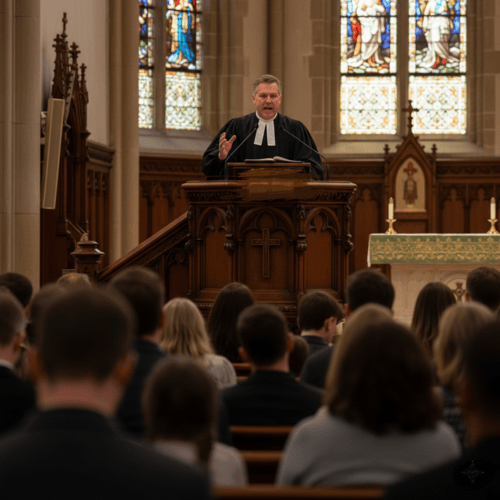What About Those Who’ve Never Heard the Gospel?…
WILL GOD SHOW THEM MERCY ON JUDGEMENT DAY?
Few questions tug at the Christian’s heart like this one. Picture the Amazon tribesman who lived and died without ever hearing the name Jesus. Or the ancient Chinese philosopher seeking truth centuries before missionaries arrived. What about the North African child who grew up hearing only Islamic teaching? Will a just and loving God condemn them for never hearing the gospel?
WHAT ABOUT THOSE WHO’VE NEVER HEARD THE GOSPEL? WHAT SCRIPTURE TEACHES
The Universal Human Condition: The Bible paints a sobering picture of humanity’s spiritual state. Paul declares “all have sinned and fall short of the glory of God” (Romans 3:23)—not some, not most, but all. This includes every Amazon tribesman, Chinese philosopher, and North African child who ever lived.
But does this mean people are condemned for circumstances beyond their control? Romans 1:18-20 provides the crucial context. Notice Paul’s logic: God has revealed Himself through creation so clearly that humanity’s rejection of Him is willful suppression of truth, not innocent ignorance. Romans 2:14-16 reinforces this, explaining that even those without written law have God’s moral requirements “written on their hearts, their conscience also bearing witness.”
The problem isn’t lack of opportunity—it’s active rebellion against the light already given.
The Exclusive Path of Salvation: Scripture is unambiguously clear about singularity in our path to salvation. Jesus declared, “I am the way, and the truth, and the life. No one comes to the Father except through me” (John 14:6). Peter proclaimed to the religious leaders, “And there is salvation in no one else, for there is no other name under heaven given among men by which we must be saved” (Acts 4:12). Paul affirmed there is “one mediator between God and men, the man Christ Jesus” (1 Timothy 2:5).
These aren’t narrow-minded exclusions—they’re declarations of the only rescue available to drowning humanity.
The Necessity of Hearing and Believing: Romans 10:13-17 presents the logical sequence: “Everyone who calls on the name of the Lord will be saved. How then will they call on him in whom they have not believed? And how are they to believe in him of whom they have never heard? And how are they to hear without someone preaching?” Paul concludes, “So faith comes from hearing, and hearing through the word of Christ.”
The passage assumes saving faith requires hearing the gospel message. This aligns with Hebrews 11:6: “Without faith it is impossible to please him, for whoever would draw near to God must believe that he exists and that he rewards those who seek him.”
THE REFORMED UNDERSTANDING: GOD’S PERFECT JUSTICE
Reframing the Question: Here’s where we must adjust our perspective. Theologian John Piper explains: “The question, ‘What about those who have never heard?’ is not first a question about the fairness of God, but about the depth of our sinfulness and the nature of what it means to be human in God’s world. The question wrongly assumes that people need an even break to be fairly condemned by God. But in reality, we have already forfeited our right to life and blessing. The question is not why some are condemned, but why any are saved.”
This reframe is crucial. Scripture teaches us all humanity stands condemned not because of what we haven’t heard, but because of what we’ve done. We’re not innocent victims of geographical accidents—we’re guilty rebels who’ve suppressed the truth about God revealed in creation and conscience.
God’s Sovereign Grace: RC Sproul provides additional clarity: “God is never obligated to save anyone. If He saves some, it is a matter of grace. If He doesn’t save others, it is a matter of justice. The unreached are not victims of geographical accident but recipients of what they, like all of us, justly deserve. The marvel is not that some are lost, but that any are saved.”
This understanding flows from the doctrine of election Paul presents in Ephesians 1:4-5. Salvation depends entirely on God’s gracious choice, not on human circumstances, timing, or geography. Those whom God has chosen will hear and believe, regardless of when or where they live.
ADDRESSING ALTERNATIVE VIEWS
The “Sincere Seekers” Theory: Some suggest sincere followers of other religions or genuinely moral people can be saved through Christ without explicit knowledge of Him. This inclusivism sounds compassionate but contradicts clear biblical teaching.
Romans 10:14-17 explicitly connects salvation to hearing and believing the gospel message. If people could be saved through sincere seeking alone, Paul’s argument about the necessity of preaching becomes meaningless. Moreover, Proverbs 14:12 warns, “There is a way that seems right to a man, but its end is the way to death.” Sincerity cannot overcome the objective need for Christ’s atoning work.
This view also undermines evangelistic urgency. If people can be saved without hearing the gospel, why did Jesus have to die? Or why would He command us to “go into all the world and proclaim the gospel to the whole creation” (Mark 16:15)?
Post-mortem Evangelisation: Others propose that people will receive an opportunity to hear and respond to the gospel after death. While emotionally appealing, this lacks biblical support and contradicts clear scriptural teaching.
Hebrews 9:27 states definitively: “It is appointed for man to die once, and after that comes judgement.” The parable of the rich man and Lazarus (Luke 16:19-31) portrays an unbridgeable chasm between the saved and lost after death, with no suggestion of future opportunity.
If post-mortem evangelisation were possible, why would Paul feel such urgency about reaching people in this life? His entire missionary enterprise makes sense only if this life is the time of decision.
Universalism: The most extreme alternative suggests all will eventually be saved. This directly contradicts numerous biblical passages about eternal judgment, including Jesus’ own words in Matthew 25:46: “And these will go away into eternal punishment, but the righteous into eternal life.” Second Thessalonians 1:9 speaks of those “who will suffer the punishment of eternal destruction, away from the presence of the Lord.”
Universalism makes both evangelism and faith ultimately meaningless, contradicting the urgent tone of the entire New Testament.
TRUSTING GOD’S PERFECT CHARACTER
In wrestling with this difficult question, we shall do well to anchor ourselves in God’s character. Abraham’s question in Genesis 18:25 provides the foundation: “Shall not the Judge of all the earth do what is just?” The implied answer is a resounding yes.
God’s ways are higher than our ways (Isaiah 55:8-9). We can trust His perfect wisdom and justice will be displayed in His final judgements. Luke 12:48 assures us judgement will be proportional to the light received: “From everyone who has been given much, much will be demanded.”
This doesn’t mean everyone receives identical treatment, but it does mean everyone receives exactly what perfect justice requires.
OUR RESPONSE: MOTIVATED EVANGELISM
Far from discouraging evangelism, this understanding should intensify our missionary passion. If people could be saved without hearing the gospel, missions would be optional. But knowing that faith comes by hearing (Romans 10:17) makes every gospel conversation eternally significant.
Paul’s joy in Romans 10:15 becomes our motivation: “How beautiful are the feet of those who bring good news!” We participate in God’s chosen method of calling His elect from every nation, tribe, people, and language (Revelation 7:9).
God’s sovereignty doesn’t make us passive—it makes us confident. We don’t carry the weight of salvation on our shoulders, but we do carry the privilege of being God’s messengers. We’re called to faithful proclamation, trusting God for the results.
CONCLUSION: WHAT ABOUT THOSE WHO’VE NEVER HEARD THE GOSPEL?
The Reformed position doesn’t soften divine justice to accommodate human sentiment—it marvels at divine grace. The real scandal isn’t that some people don’t hear the gospel; it’s that any of us, having heard it, are given faith to believe.
Every person saved represents an undeserved rescue from justly deserved condemnation. The question “What about those who’ve never heard?” ultimately points us back to the cross, where perfect justice and perfect mercy met in Jesus Christ. There we find both the answer to humanity’s universal guilt and the motivation for global evangelism.
In the end, we don’t lower the bar of divine justice to match human expectations—we raise our worship of divine grace to match heavenly reality. The Judge of all the earth will indeed do what is just, and His justice will be seen as perfect even as His grace appears infinitely glorious.
WHAT ABOUT THOSE WHO’VE NEVER HEARD THE GOSPEL? RELATED FAQs
What did the early reformers believe about the unreached? Calvin taught that all humanity receives sufficient revelation through creation and conscience to be held accountable. But this “general revelation” only serves to make us “inexcusable” rather than save us. Luther emphasised God’s existence and power are evident to all through nature, but saving knowledge comes only through the gospel. Both Reformers insisted geographical or historical circumstances don’t limit God’s sovereign election—His chosen ones will be reached by His appointed means.
- What about infants who die before hearing the gospel—are they automatically saved or condemned? Most Reformed theologians distinguish between those who die in infancy and adults who live full lives without hearing the gospel. While Scripture doesn’t explicitly address infant salvation, many Reformed scholars (following Augustine and Calvin) believe elect infants are saved through Christ’s work applied apart from conscious faith. However, this special case doesn’t extend to competent adults who have the capacity to respond to general revelation but suppress it.
- Does the Reformed position mean God predestined some to be born in unreached locations to ensure their damnation? This misunderstands the Reformed view of predestination and geography. God doesn’t predestine anyone to damnation based on location—He predestines them to salvation or passes them over in justice for their sin. Geographic location is simply the means by which God’s eternal decree unfolds in history. The reprobate reject Christ even if born in Christian families, while the elect will hear and believe regardless of their birthplace.
- How do Reformed missions organisations approach evangelism in light of this doctrine? Reformed missions agencies are actually among the most motivated in global evangelism because they understand both human lostness and divine sovereignty. Organisations operate with urgency precisely because they know people won’t be saved without hearing the gospel. They find great comfort that God’s sovereignty ensures their faithful proclamation will reach His elect, even in the most difficult fields.
What about Old Testament saints who lived before Christ—how were they saved without explicit gospel knowledge? Old Testament believers were saved by faith in God’s promises, which ultimately pointed to Christ even if they didn’t fully understand the specifics. Abraham was “justified by faith” (Romans 4:16) through believing God’s covenant promises, and Hebrews 11 shows that all Old Testament saints looked forward to the promised redemption. They were saved by Christ’s work applied retroactively through their faith in God’s revealed Word available to them. This is different from the unreached who have no special revelation at all—only general revelation which condemns rather than saves.
WHAT ABOUT THOSE WHO’VE NEVER HEARD THE GOSPEL? OUR RELATED POSTS
- Called Home Early: Reformed Perspectives on Infant Death
- Beauty from Brokenness: Christian Perspectives on Pain and Suffering
- Evil Is Just the Absence of Good? The Bible Tells Us Otherwise
- The Foreknowledge of God: Far More Than Mere Foresight
- Why Does a Loving God Allow Evil to Exist?
- The Nature of God in Christian Doctrine
Editor's Pick

Did Joseph Sin in Marrying an Egyptian?
It’s a troubling question: if God forbade His people from foreign alliances, why was Joseph’s marriage to an Egyptian not [...]

Jacob’s Ladder: How Jesus Bridges Earth and Heaven
THE GOSPEL IN GENESIS 28... A stairway to heaven—humanity has always dreamt of one since the Fall. Every religion offers [...]

In the World But Not Of It: What John 17:14-16 Really Means
Scrolling through social media, we’re bombarded by voices shouting for our allegiance—politics, trends, ideologies. As Christians, we feel the tension: [...]

Is Molinism Biblical? Reformed Challenges to Middle Knowledge
In a world craving autonomy, does God truly reign supreme, or does He negotiate with human choices? The question lies [...]

Does the Bible Teach Purgatory? Scripture’s Clear Answer
Imagine standing at the very edge of eternity, wondering if the soul requires further cleansing before you enter heaven's gates. [...]

David Danced Before the Lord—Why Don’t Reformed Churches?
When we read about King David leaping and dancing before the Lord “with all his might” (2 Samuel 6:14), a [...]

Faithful to the Pattern: Why Paul Reserves Ordination for Men
Few topics in contemporary Christianity generate more tension than women’s ordination. This question touches real lives, genuine callings, and deeply [...]

‘Flee Sexual Sin’: Why Does Paul Single This Sin Out?
When the apostle Paul writes to the Corinthian church, he doesn’t tell them to simply avoid sexual immorality or resist [...]

Does Denying God’s Sovereignty Mean Denying the Gospel?
RC Sproul once warned denying God’s sovereignty “eviscerates” grace—a strong word meaning to gut or disembowel something, leaving only an [...]

Why Christians Fast: The Biblical Discipline’s Very Real Rewards
Why would Christians, who rejoice in the good gifts of food and fellowship, deliberately choose to go without? Isn’t fasting [...]
SUPPORT US:
Feel the Holy Spirit's gentle nudge to partner with us?
Donate Online:
Account Name: TRUTHS TO DIE FOR FOUNDATION
Account Number: 10243565459
Bank IFSC: IDFB0043391
Bank Name: IDFC FIRST BANK






